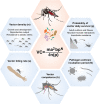The microbiome and mosquito vectorial capacity: rich potential for discovery and translation
- PMID: 34006334
- PMCID: PMC8132434
- DOI: 10.1186/s40168-021-01073-2
The microbiome and mosquito vectorial capacity: rich potential for discovery and translation
Abstract
Microbiome research has gained considerable interest due to the emerging evidence of its impact on human and animal health. As in other animals, the gut-associated microbiota of mosquitoes affect host fitness and other phenotypes. It is now well established that microbes can alter pathogen transmission in mosquitoes, either positively or negatively, and avenues are being explored to exploit microbes for vector control. However, less attention has been paid to how microbiota affect phenotypes that impact vectorial capacity. Several mosquito and pathogen components, such as vector density, biting rate, survival, vector competence, and the pathogen extrinsic incubation period all influence pathogen transmission. Recent studies also indicate that mosquito gut-associated microbes can impact each of these components, and therefore ultimately modulate vectorial capacity. Promisingly, this expands the options available to exploit microbes for vector control by also targeting parameters that affect vectorial capacity. However, there are still many knowledge gaps regarding mosquito-microbe interactions that need to be addressed in order to exploit them efficiently. Here, we review current evidence of impacts of the microbiome on aspects of vectorial capacity, and we highlight likely opportunities for novel vector control strategies and areas where further studies are required. Video abstract.
Keywords: Biting; Competence; Density; Extrinsic incubation period; Longevity; Microbiome; Mosquito; Pathogen transmission; Symbiosis; Vectorial capacity.
Conflict of interest statement
The authors declare that they have no competing interests.
Figures

References
-
- Hamidou I, Berthier D, Tchicaya B, Thevenon S, Njiokou F, Cuny G, et al. Infection, genetics and evolution population dynamics of Glossina palpalis gambiensis symbionts, Sodalis glossinidius, and Wigglesworthia glossinidia, throughout host-fly development. Infect Genet Evol. 2013;13:41–48. doi: 10.1016/j.meegid.2012.10.003. - DOI - PubMed
-
- Rocha David M, Barbosa dos Santos LM, Paulo Vicente AC, Maciel-de-Freitas R. Effects of environment, dietary regime and ageing on the dengue vector microbiota: evidence of a core microbiota throughout Aedes aegypti lifespan. Mem Inst Oswaldo Cruz. 2016;111:577–587, 9, DOI: 10.1590/0074-02760160238. - PMC - PubMed
-
- Hegde S, Nilyanimit P, Kozlova E, Anderson ER, Narra HP, Sahni SK, et al. CRISPR/Cas9-mediated gene deletion of the ompA gene in symbiotic Cedecea neteri impairs biofilm formation and reduces gut colonization of Aedes aegypti mosquitoes. PLoS Negl Trop Dis. 2019;13:7883. doi: 10.1371/journal.pntd.0007883. - DOI - PMC - PubMed
Publication types
MeSH terms
Grants and funding
- V011278/1/BB_/Biotechnology and Biological Sciences Research Council/United Kingdom
- N013514/1/MRC_/Medical Research Council/United Kingdom
- MR/T001267/1/BB_/Biotechnology and Biological Sciences Research Council/United Kingdom
- R21 AI124452/AI/NIAID NIH HHS/United States
- R21 AI138074/AI/NIAID NIH HHS/United States
LinkOut - more resources
Full Text Sources
Other Literature Sources
Medical
Research Materials

